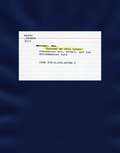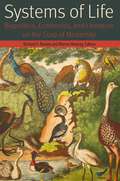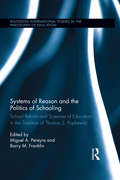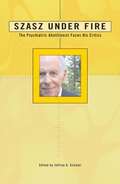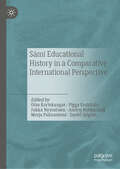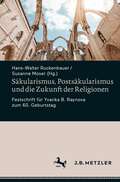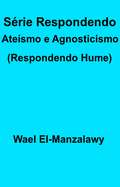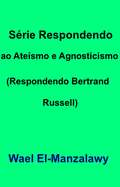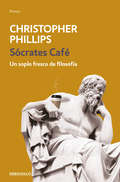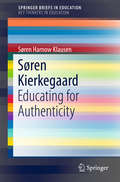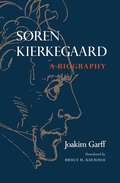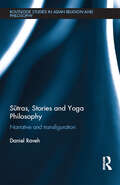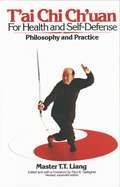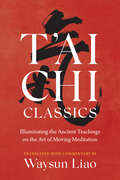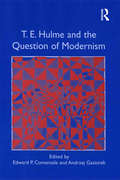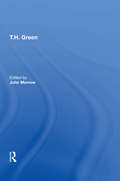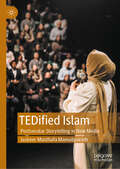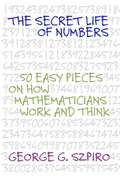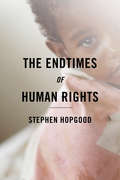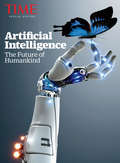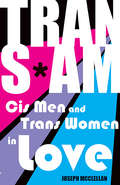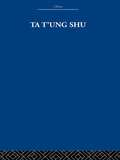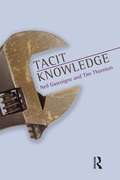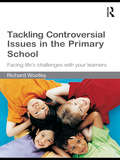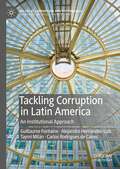- Table View
- List View
Systems We Have Loved: Conceptual Art, Affect, and the Antihumanist Turn
by Eve MeltzerBy the early 1960s, theorists like Levi-Strauss, Lacan, Foucault, and Barthes had created a world ruled by signifying structures and pictured through the grids of language, information, and systems. Artists soon followed, turning to language and its related forms to devise a new, conceptual approach to art making. Examining the ways in which artists shared the structuralist devotion to systems of many sorts, "Systems We Have Loved" shows that even as structuralism encouraged the advent of conceptual art, it also raised intractable problems that artists were forced to confront. Considering such notable art figures as Mary Kelly, Robert Morris, Robert Smithson, and Rosalind Krauss, Eve Meltzer argues that during this period the visual arts depicted and tested the far-reaching claims about subjectivity espoused by theorists. She offers a new way of framing two of the twentieth century s most transformative movements one artistic, one expansively theoretical and she reveals their shared dream or nightmare of the world as a system of signs. By endorsing this view, Meltzer proposes, these artists drew attention to the fictions and limitations of this dream, even as they risked getting caught in the very systems they had adopted. The first book to describe art s embrace of the world as an information system, "Systems We Have Loved" breathes new life into the study of conceptual art. "
Systems of Life: Biopolitics, Economics, and Literature on the Cusp of Modernity (Forms of Living)
by Richard A. Barney and Warren MontagSystems of Life offers a wide-ranging revaluation of the emergence of biopolitics in Europe from the mid– eighteenth to the mid–nineteenth century. In staging an encounter among literature, political economy, and the still emergent sciences of life in that historical moment, the essays collected here reopen the question of how concepts of animal, vegetable, and human life, among other biological registers, had an impact on the Enlightenment project of thinking politics and economics as a joint enterprise. The volume’s contributors consider politics, economics, and the biological as distinct, semi-autonomous spheres whose various combinations required inventive, sometimes incomplete, acts of conceptual mediation, philosophical negotiation, disciplinary intervention, or aesthetic representation.
Systems of Reason and the Politics of Schooling: School Reform and Sciences of Education in the Tradition of Thomas S. Popkewitz (Routledge International Studies in the Philosophy of Education)
by Miguel A. Pereyra Barry M. FranklinThe 1980s were an important decade for educational inquiry. It was the moment of the “linguistic turn,” with its emphasis on the role of language as a constructor of reality, a structuring agent for institutions such as schools, and a medium for translating knowledge into elements of power for processes of social regulation. Drawing on the work and insights of educational researcher Thomas S. Popkewitz, this book shows how the linguistic turn provided an alternative to both mainline educational research grounded in the ideals of political liberalism and the effort of neo-Marxists to challenge liberal thinking in favor of a scholarship based on class conflict and economic determinism.
Szasz Under Fire: A Psychiatric Abolitionist Faces His Critics
by Ph.D. Jeffrey A. SchalerSince he published The Myth of Mental Illness in 1961, professor of psychiatry Thomas Szasz has been the scourge of the psychiatric establishment.<P><P> In dozens of books and articles, he has argued passionately and knowledgeably against compulsory commitment of the mentally ill, against the war on drugs, against the insanity defense in criminal trials, against the "diseasing" of voluntary humanpractices such as addiction and homosexual behavior, against the drugging of schoolchildren with Ritalin, and for the right to suicide. Most controversial of all has been his denial that "mental illness" is a literal disease, treatable by medical practitioners.In Szasz Under Fire, psychologists, psychiatrists, and other leading experts who disagree with Szasz on specific issues explain the reasons, with no holds barred, and Szasz replies cogently and pungently to each of them. Topics debated include the nature of mental illness, the right to suicide, the insanity defense, the use and abuse of drugs, and the responsibilities of psychiatrists and therapists. These exchanges are preceded by Szasz's autobiography and followed by a bibliography of his works.
Sámi Educational History in a Comparative International Perspective
by Merja Paksuniemi Otso Kortekangas Pigga Keskitalo Jukka Nyyssönen Andrej Kotljarchuk David SjögrenThis book provides a comprehensive overview of Sámi education in a historical and internationally comparative perspective. Despite the cross-national character of the Sámi population, academic literature on Sámi education has so far been published within the different nation states in the Sámi area, and rarely in English. Exploring indigenous educational history around the world, this collection spans from Asia to Oceania to Sápmi and the Americas. The chapters frame Sámi school history within an international context of indigenous and minority education. In doing so, two narrative threads are established: both traditional history of education, and perspectives on the decolonisation of education. This pioneering book will appeal to students and scholars of Sámi education, as well as indigenous education around the world.
Säkularismus, Postsäkularismus und die Zukunft der Religionen: Festschrift für Yvanka B. Raynova zum 60. Geburtstag
by Susanne Moser Hans-Walter RuckenbauerWie lässt sich das Religiöse heute redlich denken? In welchem Verhältnis stehen Philosophie und Religion bzw. Theologie zueinander? Ist ein religiöser Glaube nur eine Option unter anderen oder vielmehr eine tiefe Dimension menschlicher Existenz, auch in einer pluralistischen Kultur? Inwiefern sind religiöse und liberale Werte miteinander vereinbar? Zwei gegensätzliche Diagnosen halten diese Fragen in Spannung: einerseits die Behauptung, wir lebten in einem säkularen bzw. postreligiösen Zeitalter, und andererseits die Annahme einer "Wiederkehr des Religiösen" in einer postsäkularen Epoche. Die Differenz zwischen säkular und religiös durchzieht alle kulturwissenschaftlichen Debatten und berührt gleichermaßen die Fragen zur Rolle der Ethik, einer solidarischen Lebensweise und der feministischen Theoriebildung in unseren spätmodernen Gesellschaften. In drei Perspektiven fängt der vorliegende Band die Dialektik von Religion und Vernunft ein: Die religionsphilosophische Analyse fördert grundlegende Konvergenzen und Differenzen zu Tage. Der Blick auf die faktische Parallelität von säkularen und religiösen Vollzügen unter dem gemeinsamen Dach einer sozialen Identität thematisiert die Stabilität pluraler Lebenswelten. Schließlich erweist sich der Horizont eines globalen Ethos als jener Prüfstein, am dem sich profane und religiöse Wertkonzepte behaupten müssen. Die thematisierten Diskurse korrespondieren mit den zentralen Forschungsfragen im Werk der Phänomenologin und Religionsphilosophin Yvanka B. Raynova, ordentliche Professorin für Gegenwartsphilosophie an der Bulgarischen Akademie der Wissenschaften. Der vorliegende Band gilt als Festschrift zu ihren Ehren aus Anlass ihres 60. Geburtstags.
Série Respondendo Ateísmo e Agnosticismo (Respondendo Hume)
by Wael El-Manzalawy Juliana Dias BorgesEsse livro é uma tentativa de criticar as opiniões de Hume sobre religião. Você pode ler os seguintes tópicos: Monoteísmo e Politeísmo, A Necessidade Do Criador, Corrupção do Cristianismo e Judaísmo, Homem Entre A Miséria E A Felicidade, Bem E Mal .......e outros.
Série Respondendo ao Ateísmo e Agnosticismo (Respondendo Bertrand Russell)
by Wael El-Manzalawy Juliana Dias BorgesEsse livro é uma tentativa de responder o artigo de Bertrand Russell: "Por que Não Sou Um Cristão"
Sócrates Café: Un soplo fresco de filosofía
by Christopher Phillips«Una interesante combinación de memorias y reflexión filosófica, [...] Christopher Phillips muestra con éxito un método cautivador para lograr que la filosofía prospere más ampliamente.» Publishers Weekly Hace mucho tiempo que la filosofía pareciera haber renunciado a su papel como guía en la vida de las personas y haber dejado esta función a la ciencia, la política, la autoayuda o la cultura del éxito económico y laboral. Sin embargo, las grandes preguntas de la vida como: ¿qué significado tienen el amor y la amistad?, ¿cómo puedo saber si he actuado correctamente?, ¿por qué me angustia envejecer?, no se responden tan fácilmente desde ninguna de estas trincheras. En este libro, Christopher Phillips relata su aventura de regresar la filosofía a la gente, «a dónde pertenece», a través de la organización de espacios de diálogo y convivencia en librerías, cafés, escuelas, incluso en prisiones. En estas tertulias, la pregunta por el sentido de la vida se discute con la misma tranquilidad y alegría con la que se comparte una taza de café entre amigos.
Søren Kierkegaard
by Søren Harnow KlausenThis book is a succinct guide to Søren Kierkegaard’s contribution to educational thought. Kierkegaard is not usually known as an educational thinker, but the book shows how his key notions and ideas are nevertheless highly relevant to educational theory and practice. It places them within the context of Kierkegaard’s philosophy and the philosophy of his time, while also exploring their significance to issues of contemporary concern, like the question of how far education should aim at fostering useful skills or support more ambitious goals. The central topics are Kierkegaard’s diagnosis of the limitations of objective knowledge and his corresponding emphasis on know-how, personal appropriation and subjective attitude; his analysis of more or less successful forms of self-realization; his ideas about fostering personal development through “indirect communication” and dialogue; and the elements, strengths and shortcomings of the ideal of self-cultivation (German Bildung).
Søren Kierkegaard: A Biography
by Joakim Garff"The day will come when not only my writings, but precisely my life--the intriguing secret of all the machinery--will be studied and studied." Søren Kierkegaard's remarkable combination of genius and peculiarity made this a fair if arrogant prediction. But Kierkegaard's life has been notoriously hard to study, so complex was the web of fact and fiction in his work. Joakim Garff's biography of Kierkegaard is thus a landmark achievement. A seamless blend of history, philosophy, and psychological insight, all conveyed with novelistic verve, this is the most comprehensive and penetrating account yet written of the life and works of the enigmatic Dane who changed the course of intellectual history. Garff portrays Kierkegaard not as the all-controlling impresario behind some of the most important works of modern philosophy and religious thought--books credited with founding existentialism and prefiguring postmodernism--but rather as a man whose writings came to control him. Kierkegaard saw himself as a vessel for his writings, a tool in the hand of God, and eventually as a martyr singled out to call for the end of "Christendom." Garff explores the events and relationships that formed Kierkegaard, including his guilt-ridden relationship with his father, his rivalry with his brother, and his famously tortured relationship with his fiancée Regine Olsen. He recreates the squalor and splendor of Golden Age Copenhagen and the intellectual milieu in which Kierkegaard found himself increasingly embattled and mercilessly caricatured. Acclaimed as a major cultural event on its publication in Denmark in 2000, this book, here presented in an exceptionally crisp and elegant translation, will be the definitive account of Kierkegaard's life for years to come.
Sūtras, Stories and Yoga Philosophy: Narrative and Transfiguration
by Daniel RavehThis book presents a close reading of four Indian narratives from different time periods (epic, Upaniṣadic, pre-modern and contemporary): Ekalavya's story from the Mahābhārata (MBh 1.123.1-39), the story of Prajāpati, Indra and Virochana from the Chāndogya Upanisad (CU 8.7.1-8.12.5), the story of Śankara in the King's body from the Śankaradigvijaya, and A.R. Murugadoss's Hindi film Ghajini (2008), respectively. These stories are thematically juxtaposed with Pātañjala-yoga, namely Patañjali's Yogasūtra and its vast commentarial body. The sūtras reveal hidden philosophical layers. The stories, on the other hand, contribute to the clarification of "philosophical junctions" in the Yogasūtra. Through sūtras and stories, the author explores the question of self-identity, with emphasis on the role of memory and the place of body in identity-formation. Each of the stories diagnoses the connection between self-identity and (at least a sense of) freedom. Employing cutting-edge methodology, crossing the boundaries of literary theory, story-telling, and philosophical reflection, this book presents fresh interpretations of Indian thought. It is useful to specialists in Asian philosophy and culture.
T'Ai Chi Ch'uan for Health and Self-Defense: Philosophy And Practice
by T. T. LiangFor the student who has already mastered the basic postures, this book addresses itself to the philosophy behind the system of movements and to all the variations possible.From the Trade Paperback edition.
T'ai Chi Classics: Illuminating the Ancient Teachings on the Art of Moving Meditation
by Waysun LiaoAn essential guide for T&’ai Chi practitioners of all skill levels—with an overview of basic principles and commentary on three classic internal martial arts texts According to Master Liao, the great power of T&’ai Chi cannot be realized without knowing its inner meaning. T&’ai Chi Classics presents the inner meaning and techniques of T&’ai Chi movements through translations of three core classics of T&’ai Chi, often considered the &“T&’ai Chi Bible&”. Divided into three chapters, the guide explains how to increase inner energy (ch&’i), transform it into inner power (jing), and project this inner power outward to repel an opponent without physical contact. Master Liao also provides a description of the entire sequence of T&’ai Chi movements, illustrated by his own line drawings.
T.E. Hulme and the Question of Modernism
by Andrzej GasiorekThough only 34 years old at the time of his death in 1917, T.E. Hulme had already taken his place at the center of pre-war London's advanced intellectual circles. His work as poet, critic, philosopher, aesthetician, and political theorist helped define several major aesthetic and political movements, including imagism and Vorticism. Despite his influence, however, the man T.S. Eliot described as 'classical, reactionary, and revolutionary' has until very recently been neglected by scholars, and T.E. Hulme and the Question of Modernism is the first essay collection to offer an in-depth exploration of Hulme's thought. While each essay highlights a different aspect of Hulme's work on the overlapping discourses of aesthetics, politics, and philosophy, taken together they demonstrate a shared belief in Hulme's decisive importance to the emergence of modernism and to the many categories that still govern our thinking about it. In addition to the editors, contributors include Todd Avery, Rebecca Beasley, C.D. Blanton, Helen Carr, Paul Edwards, Lee Garver, Jesse Matz, Alan Munton, and Andrew Thacker.
T.H. Green (International Library Of Essays In The History Of Social And Political Thought)
by John MorrowThis volume collects a range of the most important published critical essays on T.H. Green's political philosophy. These essays consider Green's ethical and political philosophy, his accounts of freedom, rights, political obligation and property and the location of his political theory in the discourses of Victorian liberalism. It concludes with a selection of essays that provide comparative discussions of aspects of Green's political philosophy with positions advanced by Sidgwick, Rousseau, Kant and Hegel, and with both conservative and liberal responses to his ideas that emerged in late nineteenth and early twentieth century Japan.
TEDified Islam: Postsecular Storytelling in New Media
by Jasbeer Musthafa MamalipurathThis book represents one of the initial comprehensive studies of TED Talks on Islam. It situates TED Talks on Islam as postsecular (secular’s renewed interest in faith) discourse and asks how TED represents and narrates Islam. It also examines the perspectives of both Muslim and non-Muslim TED viewers about TED’s storytelling strategies as well as on the platform. Finally, the book studies the features of the authority that both Muslim and non-Muslim TED speakers embody as ‘spokespersons of Islam’. By doing so, this book offers an empirical and context-oriented understanding of postsecular storytelling by problematising the secular translations of Islam.
THE SECRET LIFE OF NUMBERS: 50 Easy Pieces on How Mathematicians Work and Think
by George G. SzpiroMost of us picture mathematicians laboring before a chalkboard, scribbling numbers and obscure symbols as they mutter unintelligibly. This lighthearted (but realistic) sneak-peak into the everyday world of mathematicians turns that stereotype on its head.Most people have little idea what mathematicians do or how they think. It’s often difficult to see how their seemingly arcane and esoteric work applies to our own everyday lives. But mathematics also holds a special allure for many people. We are drawn to its inherent beauty and fascinated by its complexity—but often intimidated by its presumed difficulty. The Secret Life of Numbers opens our eyes to the joys of mathematics, introducing us to the charming, often whimsical side, of the discipline. Divided into several parts, the book looks at interesting and largely unknown historical tidbits, introduces the largerthan- life practitioners of mathematics through the ages, profiles some of the most significant unsolved conjectures, and describes problems and puzzles that have already been solved. Rounding out the table of contents is a host of mathematical miscellany—all of which add up to 50 fun, sometimes cheeky, shorttakes on the field. Chock full of stories, anecdotes, and entertaining vignettes, The Secret Life of Numbers shows us how mathematics really does affect almost every aspect of life—from the law to geography, elections to botany—and we come to appreciate the delight and gratification that mathematics holds for all of us.
THE endtimes OF human rights
by Stephen Hopgood"We are living through the endtimes of the civilizing mission. The ineffectual International Criminal Court and its disastrous first prosecutor, Luis Moreno-Ocampo, along with the failure in Syria of the Responsibility to Protect are the latest pieces of evidence not of transient misfortunes but of fatal structural defects in international humanism. Whether it is the increase in deadly attacks on aid workers, the torture and 'disappearing' of al-Qaeda suspects by American officials, the flouting of international law by states such as Sri Lanka and Sudan, or the shambles of the Khmer Rouge tribunal in Phnom Penh, the prospect of one world under secular human rights law is receding. What seemed like a dawn is in fact a sunset. The foundations of universal liberal norms and global governance are crumbling. "-from The Endtimes of Human Rights In a book that is at once passionate and provocative, Stephen Hopgood argues, against the conventional wisdom, that the idea of universal human rights has become not only ill adapted to current realities but also overambitious and unresponsive. A shift in the global balance of power away from the United States further undermines the foundations on which the global human rights regime is based. American decline exposes the contradictions, hypocrisies and weaknesses behind the attempt to enforce this regime around the world and opens the way for resurgent religious and sovereign actors to challenge human rights. Historically, Hopgood writes, universal humanist norms inspired a sense of secular religiosity among the new middle classes of a rapidly modernizing Europe. Human rights were the product of a particular worldview (Western European and Christian) and specific historical moments (humanitarianism in the nineteenth century, the aftermath of the Holocaust). They were an antidote to a troubling contradiction-the coexistence of a belief in progress with horrifying violence and growing inequality. The obsolescence of that founding purpose in the modern globalized world has, Hopgood asserts, transformed the institutions created to perform it, such as the International Committee of the Red Cross and recently the International Criminal Court, into self-perpetuating structures of intermittent power and authority that mask their lack of democratic legitimacy and systematic ineffectiveness. At their best, they provide relief in extraordinary situations of great distress; otherwise they are serving up a mixture of false hope and unaccountability sustained by human rights as a global brand. The Endtimes of Human Rights is sure to be controversial. Hopgood makes a plea for a new understanding of where hope lies for human rights, a plea that mourns the promise but rejects the reality of universalism in favor of a less predictable encounter with the diverse realities of today’s multipolar world.
TIME Artificial Intelligence: The Future of Humankind
by The Editors of TIMEThe future of humankindArtificial intelligence has moved beyond science fiction and into reality, changing history and touching our lives in so many ways-from how astronomers explore the edges of our universe to whether your music system understands the difference between John Legend and John Lennon. Digital assistants such as Siri and Alexa as well as the next generation of smartphones, genomic research, instant language translation and self-driving cars all incoporate artificial intelligence. In this new special edition from TIME, Artificial Intelligence: The Future of Humankind, readers delve into this fascinating field, with authoritative essays and infographics and compelling images of the machines, the science and the people that are changing the course of the future. With a history of A.I., a glossary of the terms that will soon become commonplace, a detailed Q&A and focused articles on how A.I. is changing entertainment, education, technology, communication-and everything else-TIME: Artificial Intelligence is your guide to the future.
TRANS*AM: Cis Men and Trans Women in Love
by Joseph McclellanTrans women--assigned male at birth and later transitioned into a female gender-- are recently in media because of celebrities and controversial legislation. Therefore cis men--who identify with a masculine gender they were assigned at birth--are now called upon to share their experiences as lovers of trans women. Using theory and personal anecdotes, the author questions the codes that cis men and trans women use to interpret their own and others' gendered and sexed bodies. Joseph McClellan, Assistant Professor, Department of Politics, Philosophy, and Economics, Asian University for Women, Chittagong, Bangladesh, has taught philosophy, Buddhism, and gender studies, and translated and introduced contemporary French philosopher Michel Onfray'sA Hedonist Manifesto: The Power to Exist.
Ta t'ung Shu: The One-World Philosophy of K'ang Yu-wei
by Laurence G. ThompsonFirst published in 1958.This volume translates one of the major works of modern Chinese philosophy and in so doing makes a major contribution to the study of comparative philosophy. The volume contains an extensive introduction structured as follows: 1. Biographical Sketch of K'ang Yu-wei2. Ta T'ung Shu: The Book3. A General Discussion of the One-W
Tacit Knowledge
by Tim Thornton Neil GascoigneTacit knowledge is the form of implicit knowledge that we rely on for learning. It is invoked in a wide range of intellectual inquiries, from traditional academic subjects to more pragmatically orientated investigations into the nature and transmission of skills and expertise. Notwithstanding its apparent pervasiveness, the notion of tacit knowledge is a complex and puzzling one. What is its status as knowledge? What is its relation to explicit knowledge? What does it mean to say that knowledge is tacit? Can it be measured? Recent years have seen a growing interest from philosophers in understanding the nature of tacit knowledge. Philosophers of science have discussed its role in scientific problem-solving; philosophers of language have been concerned with the speaker's relation to grammatical theories; and phenomenologists have attempted to describe the relation of explicit theoretical knowledge to a background understanding of matters that are taken for granted. This book seeks to bring a unity to these diverse philosophical discussions by clarifying their conceptual underpinnings. In addition the book advances a specific account of tacit knowledge that elucidates the importance of the concept for understanding the character of human cognition, and demonstrates the relevance of the recommended account to those concerned with the communication of expertise. The book will be of interest to philosophers of language, epistemologists, cognitive psychologists and students of theoretical linguistics.
Tackling Controversial Issues in the Primary School: Facing Life's Challenges with Your Learners
by Richard WoolleyHow do you broach family values with seven year olds? Can you help young children understand racism? Can you avoid bringing your own prejudices into the classroom? Talking effectively about controversial issues with young children is a challenge facing every primary school teacher. Tackling Controversial Issues in the Primary School provides teachers with support and guidance as you engage with the more tricky questions and topics you and your pupils encounter. Illuminated with case studies and examples of how teachers and children have confronted issues together, this book helps you understand your own perspectives and provides fresh approaches for the primary classroom. It considers how best to work with parents and carers, whole-school policies for tackling issues, and ideas for circle time, setting up international links, school councils and buddying systems. The range of challenging topics covered includes: family values racism in mono and multi-cultural settings democracy and citizenship the environment and sustainability consumerism, finances and media advertising gender, health and identity grief and loss. For all student and practising primary teachers, Tackling Controversial Issues in the Primary School provides much needed support as you help your learners face complicated ideas, find their voice and get involved in the issues that they feel make a difference.
Tackling Corruption in Latin America: An Institutional Approach (Political Corruption and Governance)
by Guillaume Fontaine Alejandro Hernández-Luis Taymi Milán Carlos Rodrigues de CairesThis book examines anti-corruption policies in Latin America. It compares best practices in public procurement and state budgets in order to provide new insights into policy design for governments, civil society organisations and international organisations engaged in the fight against corruption. The book assesses how a paradigm shift toward transparency in global governance has led to major changes in public policies in the region since the late 1990s. Using Uruguay and Chile as case studies, it then demonstrates the causal mechanisms linking transparency institutionalisation to corruption control. The book also offers recommendations for research and practice about the importance of coherent public accountability systems, that combine citizen oversight over government with government responsibility towards non-state actors. It will appeal to scholars and students of public policy, public administration and governance in Latin America, as well as those interested in political corruption.
